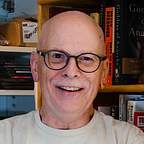The Risks Authors Take, Part II
The Risks Authors Take, Part Deux (or “Runnin’ with the Pack Dogs”), in which we discuss who’s having the most fun publishing books
A pack of huskies willingly pull their master’s sled through the snow, knowing they must work as a team to manage the task, aware there is a lead dog that they pull behind. They need the lead dog, but they don’t necessarily want to be the lead dog. Each dog in the team has a role they are trained to perform, like team members in any sport you can think of. If all the dogs don’t perform their role correctly, and at their best, the lead dog can’t either.
Curiously, publishing used to work this way as well. The lead dogs were the most successful authors, the ones who made the big bucks. Their financial contribution made it possible for the publisher to publish books by the pack authors, who often wrote good books but maybe weren’t going to ever be lead dogs — er, authors.
It was a good arrangement in which every one benefited. Yet it fell to the forces of I-me-my capitalistic greed. Every book had to at least net out for the publisher. The few authors who were capable of creating a zero-sum game for publishers were favored for publication. The remaining few who earned something still pulled the dogsled, but only the lead dog-author got the glory, fame, and the big bucks.
Then arose indie and self-publishing. What might have been a vast pool from which publishers could select new talented authors (for there was no way the New York agents and publishers had the ability or resources to reasonably get through their own slush pools). Instead, they scorned these enterprising authors as not good enough to enter their halls of glorious opportunity.
As we enter the year 2022, we see the entire publishing pyramid crumbling like a pharoah’s tomb. Many, many self- and indie-published authors are as good if not better than the New York elites. The publishing resources from Ingram and Amazon are as good if not better as well. The author has to put in a little more energy on the marketing (and increasingly on advertising), but really, not that much more than they would going with a “traditional” publisher. On a recent Author’s Guild webinar, one panelist commented that traditional publishers are rethinking their narrow selection of super-celebrities who want to tell their gossipy stories. A New York Times article pointed out another fallacy of New York agents and publishers who have based an author’s salability on their social-media platform: “Millions of Folllowers? For Book Sales, It’s Unreliable.”
Which brings me to an email I received from David Lincoln, an author and publishing colleague whose first novel, Vogel, I chose to excerpt on Fictional Café. After reading my aforementioned Part I blog post here last week, David wrote:
Good morning, Jack.
I just read your article, and I cringe at the difficulty of navigating the professional writer’s world. It all seems like so much effort, and to what end — to make money or become famous perhaps? I’m not judging, everyone is different, and their choices are their own, but it sounds so arduous to me.
I hope that for most authors writing is a flow of creative joy. Every time I sat down, it was fun, and I wondered what would happen next. New characters introduced themselves and told their stories while I made notes.
When I reached the end of VOGEL, I wondered what the editing process would be like, thinking that maybe the fun part was over, but I found the editing to be just as exhilarating. I went through it a dozen times, added depth and background where it seemed appropriate, checked all the historical references and timelines for accuracy and pruned the language as best I could. I’ve had no training, so everything was a first-time experience.
It wasn’t until I finished the story that I thought about publishing. I considered submitting the manuscript to a publisher, but I opted to self-publish for ease and quickness. My sole intention was to share it. Profitability was never a consideration and still isn’t.
I followed the same pattern with ELOISE, except I experimented with multi-character first-person perspectives. Maybe no one will ever read them, Jack, but I wrote for myself with no particular outcome needed or expected. The joy of writing is its own reward.
It’s been cold up here the last few days. Too bad you have to miss out on that being down there in Florida, huh? 😎
I’m looking forward to seeing you when you return.
Keep on finding the joy in everything you do,
David
***
May I reiterate David’s comment? The joy of writing is its own reward.
